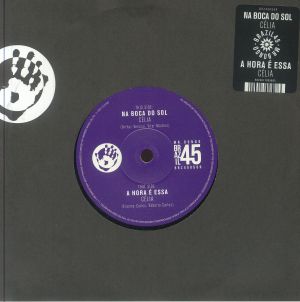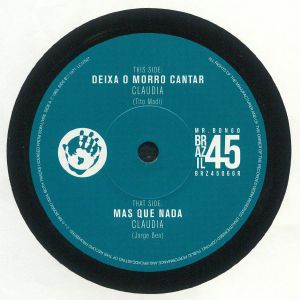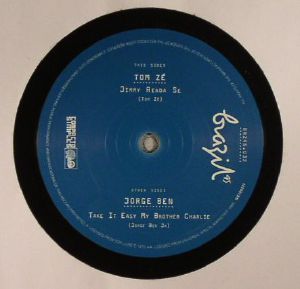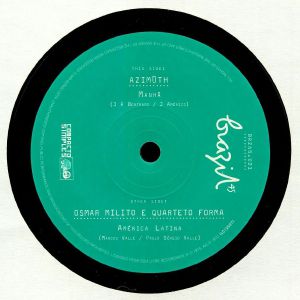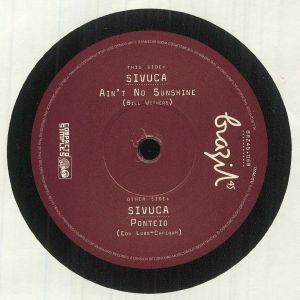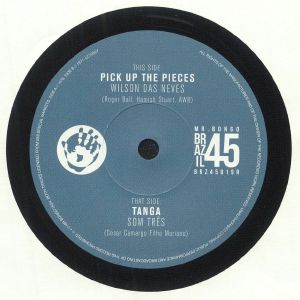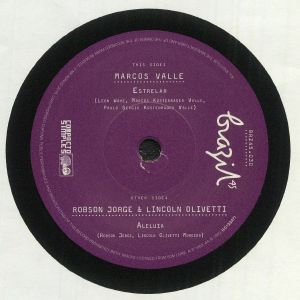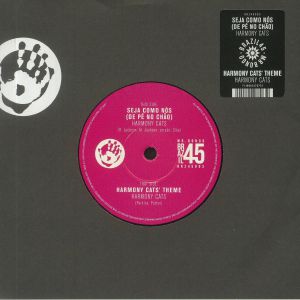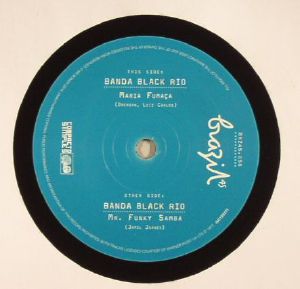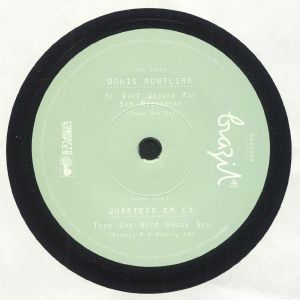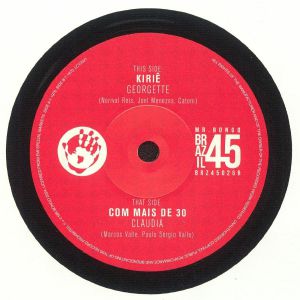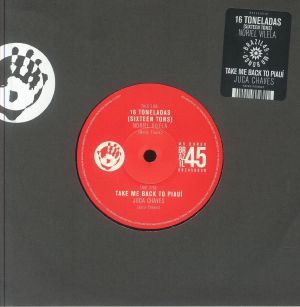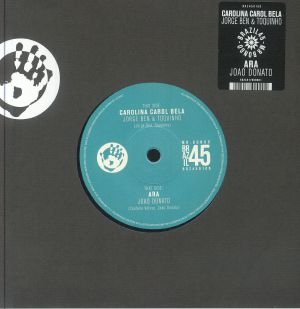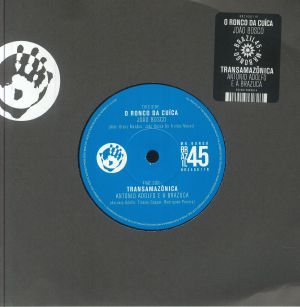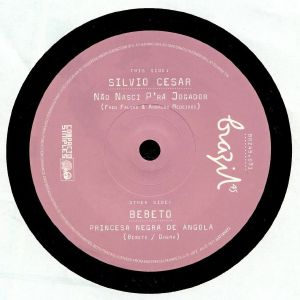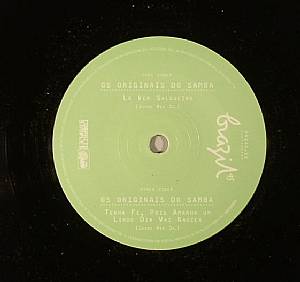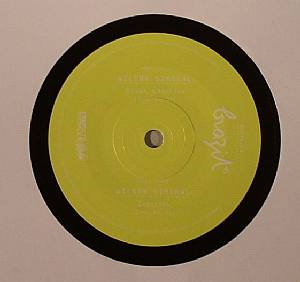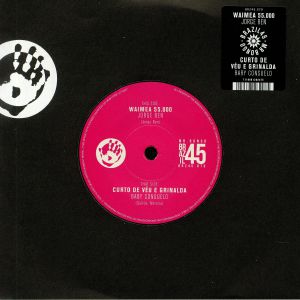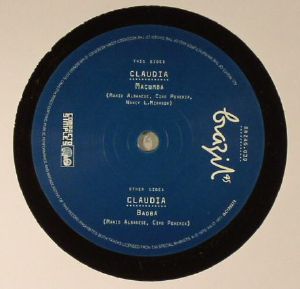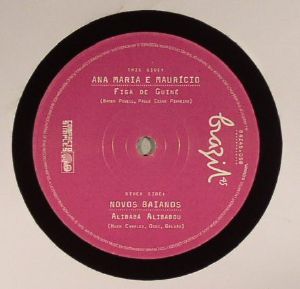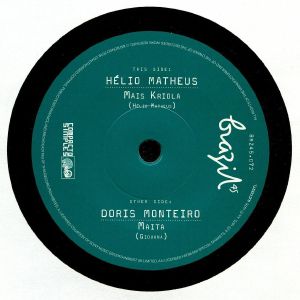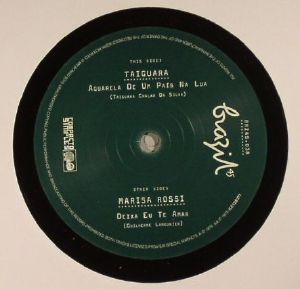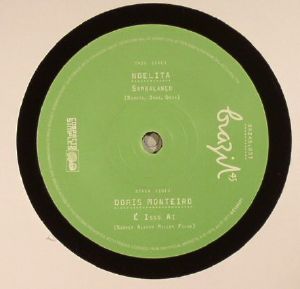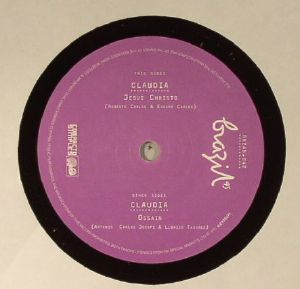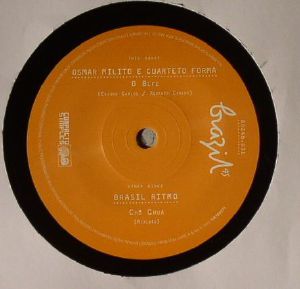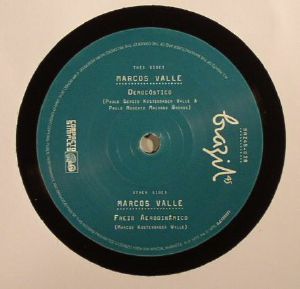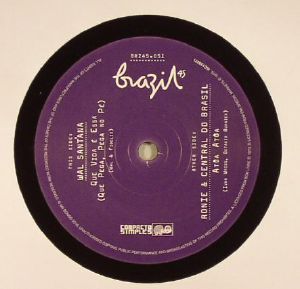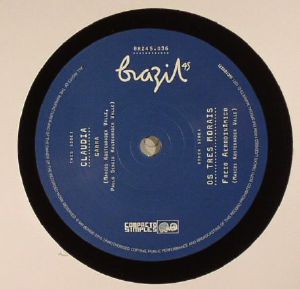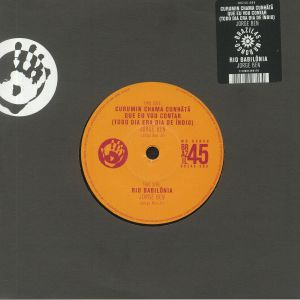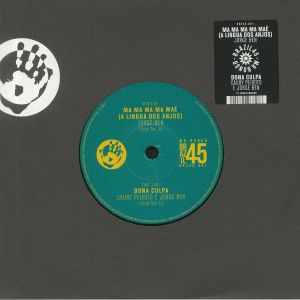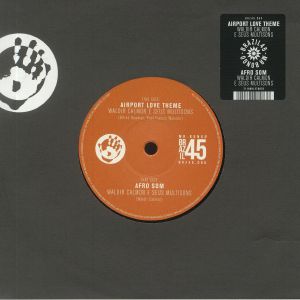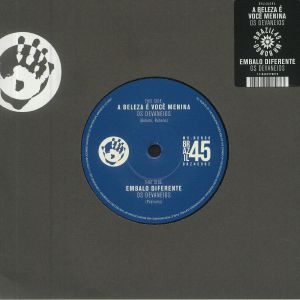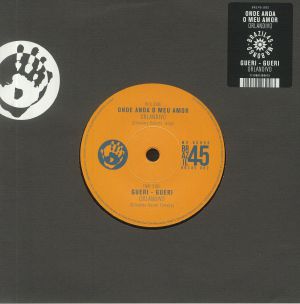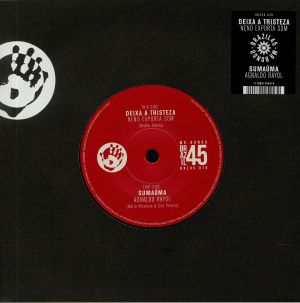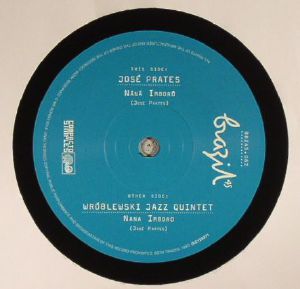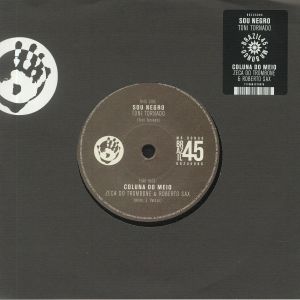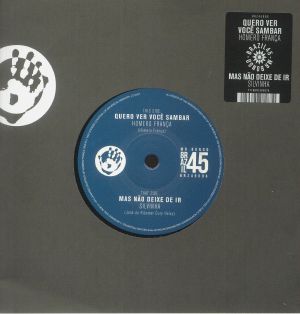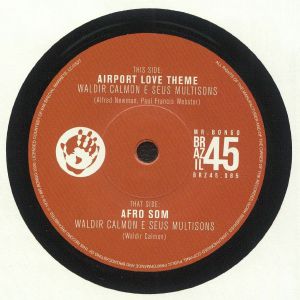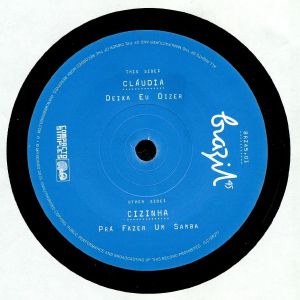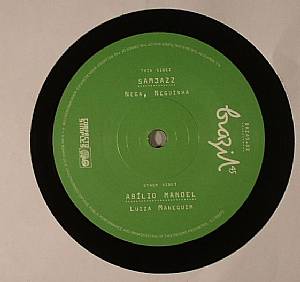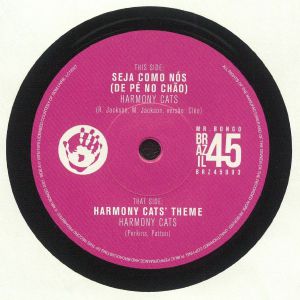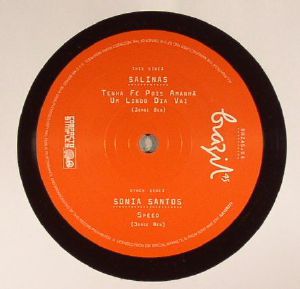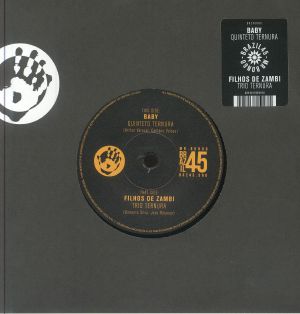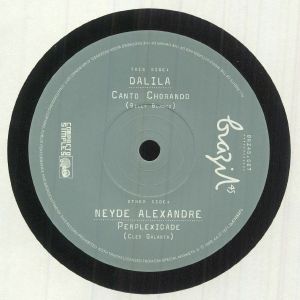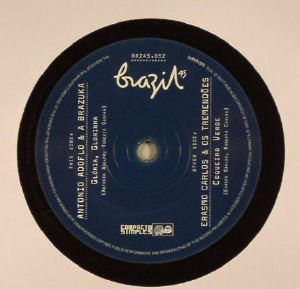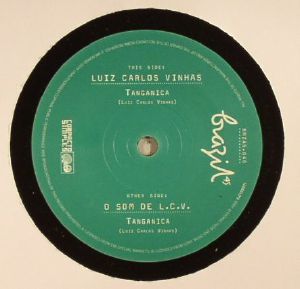Filter
International charts
Bestselling International vinylReview: The wonderful Brazil 45 series from Mr Bongo is back with its big old torch to shine a beam of deserving attention on two standout funk and bossa nova tracks from Rosa Maria, which originally came in 1972 and have remained in demand ever since. The A-side, 'Deixa Nao Deixa', blends Afro-Latin guitar, wild horns and percussion with infectious vocal harmonies that all coalesce into a Brazilian funk classic. On the B-side, 'Avenida Atlantica' delivers alternating funk and bossa beats beneath layers of vocals, horns and percussion to bring big energy and dancefloor-ready heat. This reissue ensures these timeless tracks become available for your rotation once more.
… Read morePlayed by: ISOUL8 (Volcov)
in stock $11.46
Review: Two supreme MPB/bossa nova cuts courtesy of Mr Bongo's resident popular-musica plug Claudia. The MPB singer began her career at the tender age of nine and gained recognition in the 1960s. Her repertoire extends to samba and rock, and having put out an extensive suite of LPs, we're more than faithful in Claudia's selective brilliance, not least when it comes to her own catalogue. Here on the A we have 'Deixa o Morro Cantar', which features on Claudia's very first 7", released in 1965 by RGE: a warm, burring, brass-backed beat typhoon. And on the flip side comes her timeless version of the mythic 'Mas Que Nada', a jazzier folk-funk take on the Jorge Ben classic.
… Read more in stock $11.46
Review: Two outstanding Brazilian funk cuts straight out of 1971: "Esperar Pra Ver" is a laden with an immense orchestrated groove that's triggered by a lean, unforgettable bass guitar riff that matches Evinha's purring, slinky allure. "Que Bandeira" rolls with more of a poppy bossa flow with militant rim shots, swooning strings and a momentum that builds on every verse. Both tracks are taken from Cartao Postal, Evinha's third album that has been known to pass hands for as much as L500 in the past.
… Read more in stock $12.00
Review: Mr Bongo's Brazil 45s series gets its rock on with two hairy grooves, both of which have enjoyed the sampler's crafty knives over the years. First up, Tom Ze's "Jimmy Renda-se" rolls with an oily sleazy groove that's peppered by a playful lyrical rhythm that transcends language barriers. Ben's "Take It Easy My Brother Charlie" joins the dots between Samba and very light Rock with all the signatures that made Mr Ben the legend he remains to this day with big vocal harmonies and infectious textures of Brazilian percussion.
… Read more in stock $12.00
Manha (limited 7")
Cat: BRZ45 021. Rel: 20 Apr 15
Review: A tale of two sides, Azimuth's classic "Manha" should be recognisable to many; taken from their self-titled LP in 1975, its golden harmonies and lavish, lolloping Bob James style jazz are as timeless as they were 40 years ago. Flip for "America Latina". Conjured by prolific collaborator Osmar Milito (whose discography features the likes of Sammy Davis Jr, Spanky Wilson and Liza Minelli), its striking, sing-along charms are no accident... It was actually created for 70s Brazilian soap opera Selva De Pedra.
… Read more in stock $12.00
Review: Amongst fans of Brazilian music, Sivuca is arguably best known for his 1973 cover of "Ain't No Sunshine" - later a favourite on the rare groove scene - which re-casts the Bill Withers classic as a sumptuous chunk of shuffling samba sunshine. Here, the track gets reissued as part of Mr Bongo's brilliant Brazil 45s series, alongside his lesser-known - but no less impressive - cover of Edu Lobo's "Ponteio".
… Read more in stock $12.00
Cat: BRZ 45012R. Rel: 21 Jan 25
Review: The 12th release on Mr. Bongo's signature 45s series saw a reissue of two foundational releases in Brazil's modern popular music category; now the record hears a second round, fresh again off the master metal lacquer. On the A, we hear Brazilian samba luminary Elza Soares covering Jorge Ben's classic 'Mas Que Nada' - albeit with a hoarser vocal tone, such was Soares' signature voice, one which only led to a whopping 34-album career. B-sider Elizabeth, by contrast, upholds a mystery; the artist was nicknamed "Gatinha do Mato" ("jungle cat"), and recorded 'Vou Falar-Lhe Francamente' at some indeterminate point in 1960s Sao Paolo, when and where Brazilian local styles blended with funk and rock.
… Read morePlayed by: Pete Haigh
in stock $12.00
Cat: BRZ45 019R. Rel: 20 Dec 24
Review: Mr Bongo restock a brilliant 7" in their signature Brazil 45s series. The nineteenth to grace it, this blue-starred slice of small wax shone a light on Wilson das Neves' brilliant cover of Average White Band's 'Pick Up The Pieces' on the A, as well as a Mr Bongo fave on the B, Som Tres' potent samba-funk overflow 'Tanga'. The former flexes the historic muscles of a mythic Brazilian percussionist and vibesman, lending fidgety soft feels to AWB's already lull-lifting concoction; then 'Tanga' contrasts to this sense of measuredness with pure animal verve, as Tres' calls out to his bandmates commandingly amid whirlwinds of piano and drums.
… Read more in stock $11.19
Estrelar (limited 7")
Cat: BRZ 45030. Rel: 29 May 24
Review: Two silky sides of Brazilian disco soul on Mr Bongo's perennial Brazil 45s series. First up, long-haired lothario samba fusionista Marcos teams up with Leon Ware for a pristine polished piece of early 80s disco funk. Golden harmonies, staccato vocals and a super juicy bassline; it's not hard to see why it was his best selling single. Flip for the equally smooth "Alleluia" from Brazilian boogie gospelist; this one is all about the percussion heavy breakdown. Proper sunshine block party business.
… Read morePlayed by: Mukatsuku Records Chart, JimmyTheTwin, RUSTAM OSPANOFF., Craig Charles Funk And Soul, Pete Haigh, Boy Oliver, * Record Breakin' Music *, Javi Frias, Hubbz, Voodoocuts, Bosq, Juno Recommends Funk, Galletas Calientes, Eddie C, Afro Beat Foundation, I Love Disco!, Mr Bongo Recordings, JKriv (Razor-N-Tape), Osmose, I Love 45's!, Jean Claude Gavri, Admin, CHEZZ, Chesney, Juno Recommends International, Cultures Of Soul US
… Read more in stock $12.00
Review: There have now been almost 100 hundred entries on Mr Bongo's Brazil 45 series and as far as we can tell not one of them has been a dud. This time they opt for a big and airy soul sound from The Harmony Cats. They were an all female vocal quintet that hailed from Sao Paulo and banded together in 1976. Most prolific in the disco days, the b-side here is their best known tune outside of Brazil. It's got a cosmic breakbeat and light vocals that soar to the skies. A-side 'Seja Como Nos (De Pe No Chao)' is a just as sweet sound that transports you to Latin America in an instant.
… Read more in stock $12.00
Black Soul Brothers (7")
Cat: BRZ45 05. Rel: 25 Apr 14
in stock $12.00
Review: For the latest release on their on-point Brasil 45s sub-label, Mr Bongo takes a trip back to 1977, and the early days of legendary fusion outfit Banda Black Rio. Both the cuts here are taken from the band's brilliant debut album, Maria Fumaca, and see them fusing Brasilian samba and jazz sounds with the righteous, dancefloor-friendly grooves of funk and disco. "Maria Fumaca" itself is a deliciously sunny and sweaty affair, with punchy horns, eyes-closed guitar solos and jazz-funk electic piano lines rising above a carnival-ready samba-funk groove. The U.S funk influence comes to the fore more on flipside "Mr Funky Samba", which sounds like Azymuth jamming with members of the T.K Disco, Philadelphia International and Salsoul house bands. Yep, it's that good.
… Read more in stock $12.00
Se Voce Quiser Mas Sem Bronquear (limited 7")
Cat: BRZ45 09. Rel: 08 Jan 25
Review: Mr Bongo's Brazilian 45 series hits it's ninth gear with two region-defining slices of sun-kissed samba soul. Doris takes the lead with delicate frontage. Leading from the front, all instruments follow her cues and mirror each vocal flourish with mild big band cheekiness. The instantly distinctive "Tudo Que Voce Podia Ser" from sister quartet Quarteto Em Cy is a great twist on a Latin classic with its slightly rocky guitars and full bodied harmonies. Previously released in 1972, a return has been long overdue.
… Read more in stock $12.00
Review: Mr. Bongo provide a stark slice of Brasiliera with a split 7" tackling star works from scene-fellows Georgette and Claudia, making up the 26th release in their esteemed Brazil-themed series. For this one, the label home in on two firm favourite artists of the 70s Rio scene, whose same two featuring tunes have already been released side-by-side by the label in 2015: Brazilian samba singer Georgette, whose 'Kirie' brings tense suspended flavours to a lively, formerly hard-to-obtain album cut from 1976; and fellow MPB vocalist Claudia's 'Com Mais De 30', a cover of Marcos and Sergio Valle's original version, which commands a springy downbeat and vocal echo. Both made famous again by their selections by various present day popularisers such as Four Tet and Gilles Peterson, Mr. Bongo clamp their mitts on the fervour once more.
… Read more in stock $12.00
Cat: BRZ 4503R. Rel: 20 Nov 24
Review: Mr. Bongo's Brazil.45 continues with a repress of two highly sought-after tracks from earlier in the series, this time from Noriel Vilela and Juca Chaves. On the A-side, Vilela's 1971 cover of Tennessee Ernie Ford's '16 Tons' transforms the classic American folk song into a smooth, samba-infused groove. Vilela's version reimagines the track which was originally released on Copacabana Records, with a deep rhythmic flair. On the B-side, Juca Chaves' 'Take Me Back To Piaui' from 1970 featured on his 1972 album Muito Vivo delivers lush orchestration, velvety vocals and vibrant cuica tones. It's pure escapist bliss.
… Read more in stock $10.10
Carolina Carol Bela (reissue) (limited 7")
Cat: BRZ 45010R. Rel: 29 Aug 24
Review: Jorge Ben is a legendary figure in Brazilian music, often called the James Brown of Brazil, and is famous for writing the iconic anthem 'Mas Que Nada' as well as innovating within the samba sound. Amongst many other great successes, he collaborated with singer and guitarist Toquinho on the duet 'Carolina, Carol Bela' on the Brazilian label RGE. This song was famously sampled by DJ Marky and XRS for their drum and bass track 'LK' which became a global hit and topped the UK charts. Joao Donato is a renowned Brazilian jazz and bossa nova pianist who worked with icons like Tom Jobim, Astrud Gilberto, and Gilberto Gil and his track 'A Ra' appeared on his classic 1973 album Quem e quem, which has since been recognised by Rolling Stone as one of the 100 greatest albums of all time. Both of them are real Latin gems.
… Read morePlayed by: Juno Recommends International
in stock $10.10
Cat: BRZ45 011R. Rel: 20 Nov 24
Review: The reissue of Joao Bosco's 'O Ronco Da Cuica' alongside Antonio Adolfo E A Brazuca's 'Transamazonica' captures a slice of Brazil's musical brilliance. Bosco's track, originally from his 1976 album Galos de Briga, pulses with vibrant cuica rhythms, soulful vocals, and delicate acoustic guitar. On the flip side, Adolfo's 'Transamazonica' is a stunning piece of Brazilian jazz fusion, rich with dynamic instrumentation. This release brings these timeless Brazilian gems to a new audience, reintroducing their infectious grooves and intricate musicianship.
… Read morePlayed by: ISOUL8 (Volcov)
in stock $10.10
Review: Mr Bongo take an MPB breather, tempering their recent larger-scale ambition to reissue mammoth Brazilian disco on comp with a 7" side order appetiser of a classic Brazilian MPB track. Celia's 'Na Boco Do Sol' ('At the Mouth of the Sun') is a gestalt slice of slow-samba, bringing with it a dash of torrid soul and telenovela cinematics. The favourite Arthur Verocai collaborator sings of psychic cities and imaginariums of the soul, verifying a well-travelled spirit; Verocai himself, and Vitor Martins, both lend the song a fuzzy phonic with their guitars and strings. And on the B side comes 'A Hora e Essa, the first track from her second self-titled LP: a lively samba-funk workout, doused in jazzy piano licks, strutting guitars and punchy horns.
… Read more! low stock $11.46
in stock $10.91
Review: Samba flavours do not come more authentic than this. The sixth in Mr Bongo's Brazil 45 series, here they unearth two foundation pieces from Rio collective Os Origianais Do Samba. Forming in 60s Rio, they're still highly active today and have a discography peppered with Brazilian gold. This 45 does well to showcase their breadth... "La Vem Salgueiro" is quintessential samba. Heavy rhythm, punctuated vocals and a dynamic that leaps from bold and delicate in a flash, it charms you instantly. "Tenha Fe" has a softer soul as it strums and sways and more of a folky sensation, tight harmonies and alluring naked instrumentation.
… Read more in stock $12.00
Review: Mr Bongo's Brazil 45s series continues with aplomb... On their eighth outing we find the hugely prolific 60s/70s troubadour Wilson Simonal paying homage to the legendary Jorge Ben with two exemplary cover versions. Whether it's on the soft big band emphasis and teasing fills on "Zazueira" or the upbeat, feel-good swinger "Silva Lenheira" there's a raw clarity to Wilson's vocals that instantly endure; the way he pushes his voice to the very edge of breaking on the high notes and a rich, clear delivery, he's the consummate soulful showman.
… Read more in stock $12.00
in stock $10.65
in stock $10.91
Figa De Guine (7")
Cat: BRZ 45058. Rel: 15 Dec 16
Played by: Mukatsuku Records Chart
in stock $12.00
Played by: Voodoocuts
in stock $12.00
Aquarela De Um Pais Na Lua (limited 7")
Cat: BRZ 45038. Rel: 25 Jan 16
Review: Mr Bongo's Brazil 45s series continues its consistently rich vein of form with two more beautifully contrasting - and previously difficult to track down - Brazilian soul jazz fusions from the 70s. Side A is inhabited by one of the era's most interesting individuals. Infamously censored and eventually exiled, Taiguara's chaotic flute, guitar and piano arrangement is a tight weave of melodies, counter melodies and start dynamics. Flip for the classically soul-oriented "Deixa Eu Te Amar" will bright horns, brash drums and a bold vocal from Marisa Rossi. Pow.
… Read morePlayed by: Afro Beat Foundation, The Expansions
in stock $12.00
in stock $12.00
in stock $12.00
O Bofe (limited 7")
Cat: BRZ 45031. Rel: 16 Nov 15
in stock $12.00
in stock $12.00
Que Vida E Essa (7")
Cat: BRZ45 051. Rel: 01 Jan 90
in stock $12.00
Review: Jane, Roberto, and Sidey Morais - Brazil's Os Tres Morais - are placed alongside the wonderful Claudia for the latest all Brazilian showdown courtesy of the always point-side Brazil45 series from the Mr. Bongo label. The latter gives us the mythical "Garra", a tune that sits very nicely next to the likes of Marcos Valle and co, and the singing trio get a reissue of 2006's "Freio Aerodinamico", a gorgeous blend of samba, disco, and something perfectly exotic and vintage. Heart-warmers.
… Read morePlayed by: Mukatsuku Records Chart, Mr Bongo Recordings
in stock $12.00
Cat: BRZ 45 080. Rel: 16 Oct 20
Review: Astonishingly, this is the 80th instalment in Mr Bongo's brilliant Brazil 45s series. Predictably, this edition is every bit as essential as its predecessors. It boasts two superb 1980s recordings by one of the true legends of Brazilian 20th century music, Jorge Ben. On the A-side you'll find the lengthily titled 'Curmin Chama Cunhata Que Eu Vou Contar (Todo Dia Erza Dia De Indio), a synth-splashed samba-funk tribute to the indigenous tribes of Brazil that was first featured on Ben's 1981 album Bem-Vinda Amizade. Turn to the flip for 'Rio Babilonia', a killer Brazilian boogie joint rich in squelchy synth bass, heady Latin percussion and fiery horn arrangements courtesy of the late, great Lincoln Olivetti.
… Read more in stock $12.00
Cat: BRZ 45081. Rel: 16 Oct 20
Review: Mr Bongo's excellent Brazil.45 series digs deeper into the legacy of Jorge Ben, one of Brazil's most famous musical exports and an enduring samba king. Opening up is 'Ma Ma Ma Ma Mae (A Lingua Dos Anjos)' which was originally on his 1980 album Alo Alo, Como Vai? It's a modern sound, with disco inflections and big wind sections, but also some trademark Ben playfulness in the lyrics which speak of flying saucers and angels. O the flip, things slow down and get more steamy and sensuous on 'Dona Culpa' from his Cauby! Cauby!' album of the same year. Two sides, two styles, one irrepressible artist.
… Read more in stock $12.00
Airport Love Theme (7")
Cat: BRZ 45085. Rel: 26 Mar 21
Review: Mr Bongo's reliable Brazil 45s series reaches its' 85th instalment. This time round the Brighton-based label has chosen to offer up two cuts from Waldir Calmon's 1970 set Waldir Calmon E Seus Multisons. While the album is not all that renowned, the track 'Airport Love Theme' - which resides on the A-side here - most certainly is, thanks to Madlib sampling it on the Madvillain album. It's a laidback and languid fusion of mellow soul breaks, Mexican stand-off trumpets, soaring choral vocals, Mediterranean acoustic guitars and mazy organ solos, all topped off with the sugary polish often associated with classic lounge music. Over on side B there's a chance to savour another killer cut from the same set, Jean-Jacques Perrey-esque lounge funk groover 'Afro Son'.
… Read more in stock $12.00
Review: For the latest edition in the label's superb Brazil 45s series, the Mr Bongo crew has decided to reissue one of their all-time favourite tracks, Os Devaneios' 'Embala Differente'. Situated here on side B, the track is one of the funkiest and heaviest samba floor-fillers going - a 1978 workout that adds punchy horns, disco-boogie bass, strong male lead vocals and mazy organ solos to an infectious and percussively dense rhythm track. A-side 'A Beleza E Voce Menina', a slightly later recording, is equally as impressive, with the obscure Brazilian band adding elements of soul, South American boogie and AOR to their funky-as-hell samba template. Another essential instalment in one of the most on-point reissue series around.
… Read more in stock $12.00
Review: Following persistent requests, Mr Bongo has finally relented and dedicated an edition of their popular Brazil 45s series to Orlandivo Honorio de Souza, a composer, singer and percussionist whose 1977 album Oelandivo remains high on my collectors' wants-lists. Wisely, their A-side pick is 'Onde Anda O Meu Amore', a cosmic and spacey fusion of samba-soul and jazz-funk rich in ethereal flute lines and intergalactic keys. This time round it comes backed by the equally as impressive 'Gueri Gueri', an insatiable samba-rock number wrapped in heady accordion, jangly acoustic guitar and punchy horn sounds.
… Read morePlayed by: Voodoocuts, Afro Beat Foundation
in stock $12.00
Deixa A Tristeza (7")
Cat: BRZ45 076. Rel: 07 Feb 20
Review: After delivering some killer reissues over the last few years, Mr Bongo's brilliant Brazil 45s series has reached "buy on sight" status. It goes without saying that the label's latest double-header of hard-to-find Brazilian gems is white hot. A-side Neno Exporta Som's impossible-to-find 1971 gem "Deixa A Tristeza", a wild and life-affirming fusion of samba and funk full of fuzzy sax solos, glassy-eyed vocals and heavyweight grooves. Over on the flip you'll find another killer cut from '71: "Sumauma" by MPB star Agnaldo Rayol. Blessed with a great groove and incredible arrangement, it sounds like a Brazilian take on the sort of over-the-top songs used to open James Bond movies in the 1970s (albeit with a bit of samba sunshine thrown in).
… Read more in stock $10.91
Nana Imboro (7")
Cat: BRZ45 062. Rel: 07 Feb 17
Review: The 62nd single in Mr Bongo's long-running Brazil 45s series is notable for containing Jose Prates' "Nana Imboro", a deep, hypnotic and intoxicating samba cut that was initially recorded and released way back in 1958. Relatively slow and steady by samba standards, its chanted refrain is thought to be the inspiration for Jorge Ben's much better known "Mas Que Nada". Wisely, Mr Bongo has backed Prates' sublime original with a 1960 cover by obscure Polish outfit Wroblewski Jazz Quintet. This dispenses with the chanting, instead increasing the number of intertwined horn parts. Given that original copies of the rare Polish EP it first appeared on will set you back serious money, it's great to see this fine cover included here.
… Read more in stock $12.00
Sou Negro (7")
Cat: BRZ45 086. Rel: 16 Apr 21
Review: Mr Bongo offers up an incredible 86th volume in the Brazil45 series, and this time it's Black Rio funk from two mainstays of the sound, Toni Tornado & Zeca Do Trombone. A-side 'Sou Negro' is from Tornado's 1970 EP on Odeon Records. It's a sought after number that despite lasting only just over two minutes still makes an indelible impression. Zeca Do Trombone & Roberto Sax join forces on the flip for 'Coluna Do Meio,' which is a more smooth, easy going jazz laced tune compared with the raw and direct a-side. This one has an acrobatic vocal and sunny riffs bringing pool-side vibes under clear blue skies.
… Read more in stock $10.10
Review: Mr Bongo's gold-standard Brazil-45 series turns up more irresistible musical goodness here with steamy underground bubbler 'Quero Ver Voce Sambar'. This is thought to be the only ever recording by Homero Franca and it came originally on a 7" in 1976. It's warm, soulful, quite deep for Latin music and has great vocals. On the flipside is the more fiery Silvinha tune 'Mas Nao Deixe De Ir' with the raw vocals and big horns all making for a great call and response chorus with soulful samba sounds to spare.
… Read more in stock $12.00
Cat: BRZ45 085NB. Rel: 01 Nov 24
Review: Waldir Calmon's 'Airport Love Theme' has that special appeal that makes it a true gem. Sampled by Madlib on the Madvillain album track 'Curls', this lounge classic from Calmon's 1970 Waldir Calmon E Seus Multisons LP on Copacabana exudes nostalgic charm. Despite its unassuming cover, 'Airport Love Theme' delivers a dreamy, feel-good vibe that could soundtrack a perfect world. Afro Son, from the same album, shifts towards a Brazilian-rooted, cinematic groove, reminiscent of Jean Jacques Perrey's E.V.A.. Calmon, a Brazilian music fixture from the 50s to the 80s, who collaborated with legends like Tom Jobim and Joao Gilberto and left a unique musical legacy that lives on in these timeless tracks.
… Read morePlayed by: Juno Recommends International
in stock $10.10
in stock $12.00
in stock $12.00
Review: The Brazil45 series has always been pure gold and now come a pair f beauties from Harmony Cats, a vocal quintet-turned-trio from Sao Paulo known for their disco-era hits. Harmony Cats' 'Theme' from 1976 is their most recognised track outside Brazil and is inspired by Rhythm Heritage's Barretta's Theme with its spacey breakbeats, lush vocals and percussive flair, all of which have made it a true crossover classic. On the B-side, 'Seja Como Nos (De Pe No Chao)' delivers an exuberant Brazilian twist on The Jacksons' 'Shake Your Body (Down to the Ground)'- it's a guaranteed floor-filler with radiant disco energy and Harmony Cats' signature vocal style.
… Read morePlayed by: Juno Recommends International
in stock $10.10
Cat: BRZ 4504. Rel: 27 Mar 14
in stock $10.91
Baby (remastered) (7")
Cat: BRZ 45060R. Rel: 27 Sep 24
Review: The remastered 7" reissue from Brazil 45s/Mr Bongo features two highly coveted tracks from Quinteto Ternura and their predecessor, Trio Ternura. This pressing revives two rare gems from the past with a fresh, high-quality cut. On Side-1, Quinteto Ternura delivers 'Baby,' a dazzling Brazilian modern soul track penned by Caetano Veloso and arranged by Arthur Verocai. Originally from their 1974 self-titled LP, this song is a smooth blend of tropical bliss and has long been a cherished rarity. Flipping to the Side-2, Trio Ternura's 'Filhos De Zambi' offers an upbeat samba-funk delight. Released in the same year, this track is filled with vibrant energy from the original trio, featuring a catchy chorus and a dynamic key change. Co-written by the siblings' father Umberto Silva and Jose Ribamar, it remains a dancefloor favorite. This reissue provides a valuable opportunity to own these classic tracks in their prime.
… Read morePlayed by: Juno Recommends Funk
in stock $10.10
Review: The Brazil 45s / Mr Bongo outlet is back with its classic moves, coming through with some truly special soul blends out of the Brazilian golden era. Dalila and Neyde Alexandre feature in this latest 7", the former with 1968's "Canto Chorado", a slow-burning bubble of funky exotica - surely impossible to find in its original shade - and the latter with a funky little bomb from 1971 by the name of "Perplexidade" - surely the smoothest, sexiest soul number out this week! Lovely stuff.
… Read more in stock $11.46
in stock $12.00
in stock $12.00

 USD
USD






